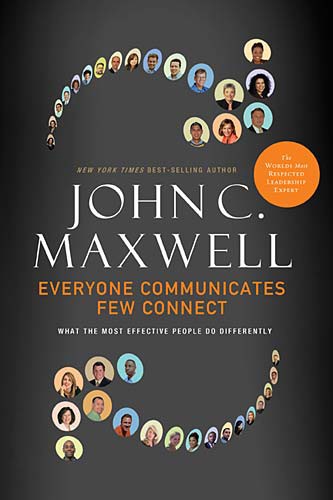It’s not enough just to work hard. It’s not enough to do a great job.
Connecting Increases Your Influence in Every Situation—If you can connect with others—one-on-one, in groups, and with an audience—your sense of community improves, your ability to create teamwork increases, and your influence skyrockets.
People who connect with others have better relationships, experience less conflict, and get more things done than those who cannot connect. Leaders who have learned the art of connection are able to communicate their ideas persuasively, establishing buy-in and attracting followers.
Connecting is All About Others— Good communicators have enough humility to recognize that they are not the expert authorities on all matters. They endeavor not to impress people with knowledge, but to connect with others authentically in order to gain the opportunity to influence them. As such, they patiently seek to understand their audience before speaking.
Connecting Goes Beyond Words— Audiences respond to how a communicator makes them feel rather than to what a communicator has to say. Our actions, tone and style communicate far more than our words. Experts estimate that 90% of the impression we convey has nothing to do with what we actually say.
Connecting Always Requires Energy—Connecting with others only happens intentionally. As a communicator, you receive a response to the extent that you invest and prepare. You can’t just step up to the microphone and expect to wow the crowd. First, you must step toward the audience relationally and emotionally by personalizing the message to suit their content.
Connecting is More Skill Than Natural Talent—People aren’t born with the ability to connect, nor does it develop by accident. Connection happens when people hone their skills and mine their experiences. Great communicators make the most of their background, personality, natural abilities, and knowledge in order to engage an audience—whether in conversation with one person or when speaking to a gathering of thousands.
Connectors Connect on Common Ground—All positive relationships are built on common interests and values. They are founded upon agreement, not disagreement. Even so, leaders neglect searching for common ground. They make assumptions about what others want, get wrapped up in their own agenda and try to control situations rather than collaborating with their team.
Connectors Do the Difficult Work of Keeping it Simple—Life’s issues can be maddeningly complex, and a leader’s job is to bring simplicity and clarity to them. Anyone can identify a problem and point out why it’s a dilemma. However, only good leaders are able to cut through the haze of complexity to arrive at a concrete solution.
Connectors Create an Experience Everyone Enjoys—How you communicate often carries more weight than what you say. Craft your communications appealingly so that you do not bore audience. Having the right message does not matter if your delivery of it puts people to sleep.
Connectors Inspire People—The energy that people put into their work depends upon the inspirational qualities of their leader. Inspiring leaders demonstrate belief in the mission, make evident their value for the team, and communicate high expectations. Leaders who combine these qualities motivate people to contribute their utmost to the organization’s goals.
Connectors Live What They Communicate— In the short run, people judge a leader on his or her communication skills. In the long run, people follow what they see instead of what they are told. They can spot a fraud, and they will not go along with a leader unless they can trust the leader’s convictions and character.

Make Connections
IT ISN’T EXPERIENCE. IT ISN’T TALENT. If you want to succeed, you must learn how to connect with people. And while it may seem like some people are just born with it, the fact is anyone can learn how to make every communication an opportunity for a powerful connection.
Get your copy today! Visit my John Maxwell Team website to purchase this book and many other great materials.

